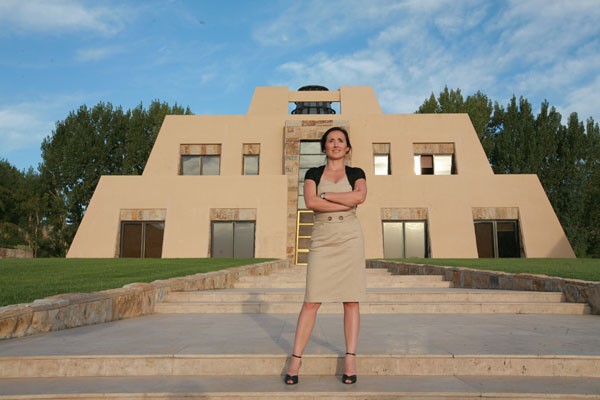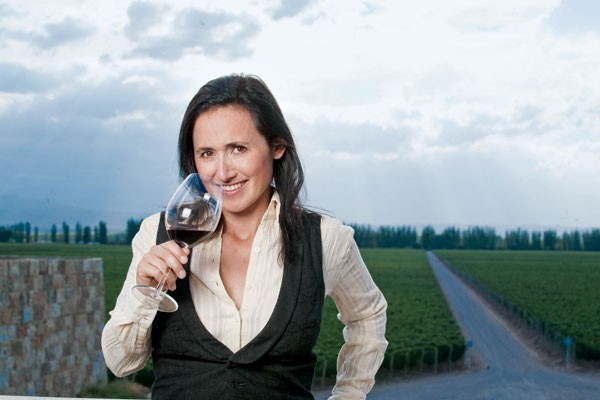Does this email look funny? If so, please visit the online version.
Princess of WineAs a scientist and Emergency Physician, Laura Catena leads the family winery, a traditional Argentine icon, in the land she loves. Her cover letter: Malbec.By Sabrina Cuculiansky. Photographs by Graciela Calabrese.
Great wines do not need to wear a suit and tie to show who they are. Good grapes come from good vineyards and good wines come from grapes that have been properly looked after. Last but not least, when the head of the winery, deeply in love with its land, is a tireless researcher, an emergency phisician and a lover of her people and her work, good wine is no surprise. Such hard worker is Laura Catena, the daughter of the “King of Wine” (the way she likes to call her beloved father, Nicolás). In fact, last year Nicolas Catena was named Decanter Magazine's 2009 Man of the Year. “It took Bordeaux 500 years to create a grand cru, while my father did it in ten,” says the wine princess proudly. Laura's contribution to the winery started in the 1980's. Even though it was her father who introduced high-end Agentinian wine to the world with his 1997 Nicolas Catena Cabernet Sauvignon, it was Laura who worked relentlessly to position Malbec internationally. While she was studying in the United States, she came frequently to Mendoza and supervised the family’s Malbec plantings. “We carried out an extensive selection of plants in order to determine if we could make a world class Malbec. We did lots of research. Nobody knew, for example, that during the XVIII century Malbec was one of the most important grapes in the world” explains Laura. First, 150 different rows were planted in the Catena vineyards. Secondly, there was a selection of the best 15 cuttings and finally, only 5 cuttings, selected from Catena Zapata’s oldest vineyard, the Angelica vineyard (named after Laura`s grandmother), were chosen. Later on, similar experiments were made with Cabernet Sauvignon and Chardonnay brought from Bordeaux and Napa.
Father and DaughterWhen Laura was studying in the United States, Nicolás often visited her at Harvard University. They would go out for dinner and taste some of the finest wines in the world. Today, Laura’s father takes care of her children when she is in Mendoza. “My father likes to say that I was the one behind our revolution with Malbec,” says Laura smiling. Laura Catena splits her time between San Francisco and Mendoza. She adds: “The truth is that my father loved Cabernet Sauvignon. So it took me several years to convince him about Malbec. It is important that every family member should contribute with his own thinking. I'm an expert at telling my father’s story. And I never feel that his story takes away from mine. I know what I've done in the winery and I have my own wines: Luca, which have received many good reviews. Our winery is a family business, and I wish it will last for another 400 years like a French chateau.” Laura began working at the winery in a formal manner in 1996, when she planted the first Malbec cuttings she had been previously studying. Her first job title was of a researcher. “When I talked about wine in the US, people used to ask me if I was talking about Chilean wine. I could see how hard my father was working and how difficult it was. I wanted to help him. He is my idol, one of those people who’s always helping you to improve. That's why I started doing research”. After several years of working as an emergency phisician (where she met her husband and father of her three children) and at the export department of the winery, she decided to reduce her medical job by half. Now, she only works as a phisician four days a month. You love the on- going challenge… It’s fascinating: you have in front of you a patient that has to be diagnosed. You run to save him while you keep paying attention to other patients coming in. I couldn`t be sitting all day in an office… Today, Laura is leading Bodega Catena Zapata, one of the Catena family’s wineries. “I am the boss, and even though we discuss everything with everyone, there is one major thing we are all aware of: were are a family and every single worker is a part of it. Medicine involves that kind of love, the same kind of love I feel for wine and our people.” How do you make a wine ranked over 90 points? First of all you need to have a special place and that's part of our history. We had vision, but we also had a special place, a special land. Vineyards planted at 5,000 feet above sea level with perfect sunlight. This is unique and we should just be thankful that we grow vines in High Altitude Mendoza. Then you need good vineyard management, low yields and extreme care and precision. We were Malbec pioneers. When we released our Catena Malbec, Argentina had never made a world-class Malbec before. I had to insist a lot for my father to release the first Catena Malbec, because it had never been done before and we weren’t sure of the success. In 2001, the Catena Zapata Winery - inspired by Mayan pyramid design - was finished, and Laura became more and more involved, taking part in all the blending decisions at the winery. Ten years later, at the age of 42, she is President of Bodega Catena Zapata. “In family run companies you have to earn your way. Today I do enjoy this title. It’s just a natural thing, and I’m not scared. My medical background has helped me pay attention to detail and perfection. I come from a tough field and that is precisely what we do here to obtain world-class quality.” Do you and your father have the same approach to work? Even though I started as a tough scientist, I believe that I have become more “artisanal” than my father. Over the years, in addition to research, I started focusing on the history of the family, on my grandfather’s views, on the Angelica Vineyard, on what a certain vineyard worker advised, etc. In fact, much of our knowledge comes from folklore, which can sometimes reveal things that are hard to uncover through research. I do apply research and statistics to production and sales numbers though. How important are scores for you? A good wine almost always gets a good score: it’s the wine you find delicious, concentrated, with an intense nose. However, the difference between a wine ranked 95 and a wine ranked 100 lies with the person who tastes it. In the US and Europe scores are important when it comes to sales. However, I make wines that I personally like. When I sell something I love, I sell it regardless of the score. How do you make decisions? We have a rule: I am the nose of the winery and my father is the palate. I win with Malbec and my father wins with Cabernet Sauvignon, which is the wine he likes best. He is very wise and I'm a young person, with lots of passion. The rule is I always have to listen to his argument first. We usually come to an agreement, but the final decision is mine. Which is your present challenge? To continue doing what my great grandfather, grandfather and father have been doing for a long time. To position Argentina as one of the best wine regions in the world and to try to be among the best wines worlwide. |
|


